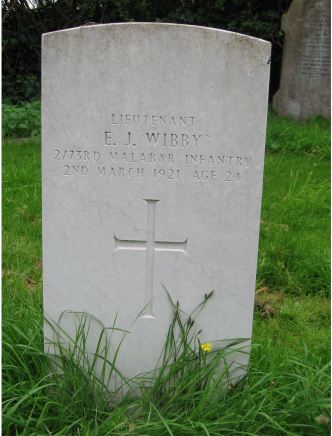2nd Battalion, 73rd Malabar Infantry, Indian Army

Edward John (Jack) Wibby was born in Gloucester, in the second quarter of 1896. He was the only son of John and Susan Wibby of 2 The Beeches, Tuffley Avenue, Gloucester, who also had six daughters.
On 12 August 1914 left his occupation as a clerk and attested for a three year short service engagement in the Gloucestershire Regiment and was posted to the 7th Battalion, with the number 10262. He was rapidly promoted to Lance Corporal on 14 September 1914, Corporal on the following 22 October and Sergeant on 21 January 1915.
His service was in the UK until 18 June 1915, and from 19 June to 12 August 1915 he was part of the Mediterranean Expeditionary Force, fighting at Gallipoli, after landing there in July 1915. The 7th Glosters were involved in the heavy fighting on Chunuk Bair in early August. On or about 12 August he suffered a gunshot wound to his ‘upper extremities’ and was evacuated from the Peninsula, arriving in Alexandria, Egypt on board the Hospital Ship Alaunia on 17 August 1915.
He would appear to have stayed in Egypt, recovering from his wound, until 9 April 1916, when he sailed from Port Suez to Basra, Mesopotamia (now Iraq), arriving 23 April 1916. The 7th Glosters had been in Mesopotamia since February 1916. His ‘Casualty Form — Service in Action’, with his record in the National Archives (WO339/139225), notes that he suffered from attacks of malaria in June 1916, December 1916, February and May 1917. He also sustained a gunshot wound to his right leg on 10 March 1917, receiving treatment at 40th Field Ambulance before being admitted to 32nd British General Hospital, Amara on 17 March 1917. He remained in Mesopotamia until 3 August 1917.
His record shows that he then transferred to India on 4 August 1917. As no battalions of the Glosters were located in India at that time it is possible that this was an attachment to an Indian Army unit, particularly as on 29 April 1918 he moved to 3rd Reserve Battalion (India) at Bangalore and on 6 June 1918 he was discharged from the Glosters, as a result of being granted a temporary commission in the Indian Army — this as a Second Lieutenant in the above battalion.
Second Lieutenant Edward John Wibby died on 2 March 1921, aged 24 and was given a CWGC headstone. Their register states that he was a Lieutenant in 2/73rd Malabar Infantry, Indian Army. The circumstances of death are currently unknown. He left only £60 in his estate, which was administered by two of his sisters.
There is a note in his National Archives’ file that on 25 May 1915 his father died as a result of being run over by a timber carriage. A solicitor applied to the War Office for his release from the Army, in order for his to take over the running of the family business, which was contributing to the war effort. Presumably permission was not granted.
Researched by Graham Adams 6 October 2011
